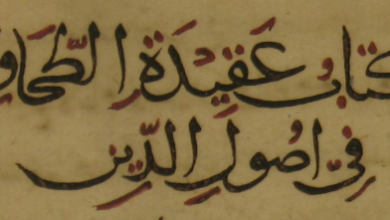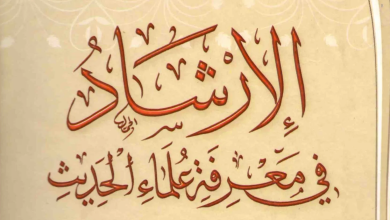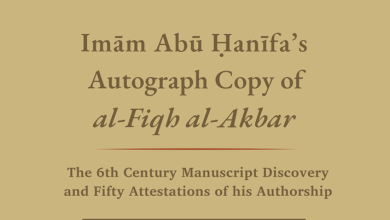THE AUTHENTICITY OF THE HADITHS ON THE DEEDS OF THE UMMAH BEING PRESENTED TO ALLAH’S MESSENGER ﷺ
This study in excess of 700 pages presents a critical analysis of narratives pertaining to some unique attributes conferred upon the Prophet Muhammad ﷺ by Allah, as documented in primary Hadith literature. The research methodology encompasses a comprehensive examination of both manuscript and published sources, with the aim of systematically evaluating and affirming the authenticity of specific narrations. The main narration that shall be presented and analysed for its authenticity is the following from the Musnad of Imām Abu Bakr Ahmed al-Bazzār (5/308-309):
1925 – حَدَّثَنَا يُوسُفُ بْنُ مُوسَى، قَالَ: نا عَبْدُ الْمَجِيدِ بْنُ عَبْدِ الْعَزِيزِ بْنِ أَبِي رَوَّادَ، عَنْ سُفْيَانَ، عَنْ عَبْدِ اللَّهِ بْنِ السَّائِبِ، عَنْ زَاذَانَ، عَنْ عَبْدِ اللَّهِ، عَنِ النَّبِيِّ صَلَّى اللهُ عَلَيْهِ وَسَلَّمَ قَالَ: «إِنَّ لِلَّهِ مَلَائِكَةً سَيَّاحِينَ يُبَلِّغُونِي عَنْ أُمَّتِي السَّلَامَ»
قَالَ: وَقَالَ رَسُولُ اللَّهِ صَلَّى اللهُ عَلَيْهِ وَسَلَّمَ: «حَيَاتِي خَيْرٌ لَكُمْ تُحَدِّثُونَ وَنُحَدِّثُ لَكُمْ، وَوَفَاتِي خَيْرٌ لَكُمْ تُعْرَضُ عَلَيَّ أَعْمَالُكُمْ [ص:309]، فَمَا رَأَيْتُ مِنَ خَيْرٍ حَمِدْتُ اللَّهَ عَلَيْهِ، وَمَا رَأَيْتُ مِنَ شَرٍّ اسْتَغْفَرْتُ اللَّهَ لَكُمْ» ، وَهَذَا الْحَدِيثُ آخِرُهُ لَا نَعْلَمُهُ يُرْوَى عَنْ عَبْدِ اللَّهِ إِلَّا مِنْ هَذَا الْوَجْهِ بِهَذَا الْإِسْنَادِ
The meaning of what al-Bazzār transmitted:
“Yusuf ibn Musa narrated to us: He said: Abd al-Majīd ibn Abd al-Aziz ibn Abi Rawwād narrated to us from Sufyan from Abd Allāh ibn al-Sā’ib from Zādhān from Abdullah (ibn Mas’ud) from the Prophet (ﷺ) who said: ‘Indeed, Allāh has angels who travel around, conveying the greetings of my Ummah to me.’
He said: The Messenger of Allāh (ﷺ) also said: ‘My life is good (khayr) for you, for you narrate and I relate to you [the revelations and guidance]. And my death is good (khayr) for you, for your deeds will be presented to me. Whatever good I see, I praise Allāh for it, and whatever evil I see, I ask Allāh’s forgiveness for you.’
(Al-Bazzār said): The latter part of this hadith, we do not know it narrated from Abdullah except through this channel with this chain of transmission.”
The above narration shall be examined in greater detail, and especially about the reliability of the subnarrator: Abd al-Majīd ibn Abd al-Aziz ibn Abi Rawwād.
This approach is employed to counter assertions made by certain contemporary writers who purport to adhere to the methodological principles established by early Hadith authorities and the Salaf.
The study will introduce and address relevant claims made by these individuals, including the late Muhammad Nasirud-Din al-Albani (d. 1999) and his less prominent but ardent followers who have contributed to this discourse in English, such as Abu Khuzaimah Ansari, Ali Hassan Khan, and Farid al-Bahraini. A thorough critique of their claims and conclusions will be presented, identifying and analysing potential shortcomings in their work.
The refutation of these claims will be conducted through a judicious application of Hadith sciences and by referencing authoritative scholars from Islamic history. This approach aims to ensure a fair and academically rigorous assessment of the contentious issues at hand.
The overarching objective of this research is to establish, with scholarly precision, the nature and status of these narrations. This will be achieved through a meticulous academic approach firmly grounded in classical Hadith scholarship, thus contributing to the broader field of Islamic studies and Hadith criticism.
The research traced the scholarly engagement with these narrations from earlier generations to contemporary academics and Hadith scholars. Notable scholars discussed include:
• Al-Ḥāfiẓ Abū Zurʿa Walī al-Dīn al-ʿIrāqī (d. 826 AH)
• Al-Ḥāfiẓ Nūr al-Dīn al-Haythamī (d. 807 AH)
• Imām Jalāl al-Dīn al-Suyūṭī (d. 911 AH)
• Imām Nūr al-Dīn al-Samhūdī (d. 911 AH)
• Imām Aḥmad ibn Muḥammad al-Qasṭallānī (d. 923 AH)
• Imām ʿUthmān ibn ʿĪsā al-Ṣiddīqī al-Ḥanafī (d. 1008 AH)
• Imām ʿAlī al-Qārī al-Ḥanafī (d. 1014 AH)
• Imām Fāʾid ibn Mubārak al-Abyārī (d. 1016 AH)
• Imām Shihāb al-Dīn Aḥmad al-Subkī (d. 1032 AH)
• Imām Shihāb al-Dīn Aḥmad al-Khafājī (d. 1069 AH)
• Imām Muḥammad ibn ʿAbd al-Zarqānī (d. 1122 AH)
• Imām Ismāʿīl al-ʿAjlūnī (d. 1162 AH)
• Shaykh Muḥammad al-Safārīnī al-Ḥanbalī (d. 1188 AH)
• Shaykh Aḥmad al-Qallāwī al-Shanqīṭī (d. 1276 AH)
• Shaykh Ibrāhīm ibn ʿUthmān al-Samnūdī (d. 1326 AH)
• Shaykh Muḥammad al-Khiḍr al-Shanqīṭī (d. 1354 AH)
• Shaykh ʿAbdullāh al-Ghumārī (d. 1993 CE)
• Shaykh Muḥammad ʿAwwāma
• Dr. Sulaymān ibn Ḥamad al-ʿAwda
• Shaykh Muḥammad Abū al-Hudā al-Yaʿqoūbī
• Dr. Islām al-Ḥussainī Ṭāhā
• Dr. ʿAlī Nāyif al-Shuḥūd
• Dr. ʿAbd al-Raḥīm Ṭaḥḥān al-Nuʿaymī
The work explored the broader theological context of these narrations, including discussions from scholars such as:
– Imām Abul Abbās Aḥmed ibn ‘Umar al-Qurṭubī (d. 656 AH)
– Imām Sibṭ Ibn al-Jawzī (d. 654 AH)
– Shaykh of the Salafis: Ibn Taymiyya (d. 728 AH)
– Shaykh of the Salafis: Ibn Qayyim al-Jawzīyya
– Imām ibn Rajab al-Hanbali (d. 795 AH)
– Al-Ḥāfiẓ Ibn Ḥajar al-ʿAsqalānī (d. 852 AH)
– Imām Ibn ʿAllān (d. 1057 AH)
– Imām Ismā’īl Ḥaqqī (d. 1127 AH)
– Shaykh Shihāb al-Dīn Maḥmūd al-Ālūsī (d. 1270 AH)
– Shaykh Muḥammad al-Majlisī al-Shinqīṭī (d. 1302 AH)
– Shaykh ‘Abd al-Hafiz al-Makki (d. 2017 CE)
In conclusion, the narration from Ibn Mas’ud (ra) as recorded by al-Bazzār in his Musnad is at least Hasan if not Sahih. The position of it being a weak narration was not a notable stance throughout Islamic history, but posited mainly by revisionists from the self-acclaimed Salafi sect. The mursal variant from Bakr ibn Abdullah al-Muzanī was also presented, and it is also Sahih and is a valid supporting narration to the one from Ibn Mas’ud (ra).
DOWNLOAD FROM – HERE






